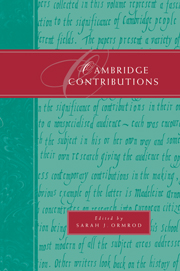Book contents
- Frontmatter
- Contents
- Notes on contributors and contributions
- Preface
- 1 Some Cambridge contributions to astronomy and cosmology
- 2 Cambridge's contribution to medical science
- 3 Cambridge and the study of English
- 4 The Cambridge contribution to economics
- 5 ‘Nasty forward minxes’: Cambridge and the higher education of women
- 6 Cambridge Classics for the third millennium
- 7 Cambridge contributions: the philosophy of science
- 8 European citizenship and education
- 9 The University Botanic Garden
- 10 Geophysics in Cambridge: extinct and active volcanoes
- 11 Cambridge spies: the ‘Magnificent Five’, 1933–1945
6 - Cambridge Classics for the third millennium
Published online by Cambridge University Press: 31 December 2009
- Frontmatter
- Contents
- Notes on contributors and contributions
- Preface
- 1 Some Cambridge contributions to astronomy and cosmology
- 2 Cambridge's contribution to medical science
- 3 Cambridge and the study of English
- 4 The Cambridge contribution to economics
- 5 ‘Nasty forward minxes’: Cambridge and the higher education of women
- 6 Cambridge Classics for the third millennium
- 7 Cambridge contributions: the philosophy of science
- 8 European citizenship and education
- 9 The University Botanic Garden
- 10 Geophysics in Cambridge: extinct and active volcanoes
- 11 Cambridge spies: the ‘Magnificent Five’, 1933–1945
Summary
The dread words ‘Classics’ and ‘Classicist’ tend, I suspect, to conjure up an image not just of the antique but of the antiquated: of dryasdust pedants poring over time-expired creations of literary or visual art. That image is of course a million miles from the reality. In this essay, therefore, rather than only looking back, I shall be also - and chiefly - looking forward, taking a leaf out of Foundations for the Future, the catalogue accompanying Cambridge University's pioneering exhibition of that title held at Christie's early in 1995. I shall not neglect the foundations of the present-day study and teaching of Classics in Cambridge, but the emphasis will be placed firmly on their future in the foreseeable term.
My main theme will be cross- or inter-disciplinarity. Classics will be represented here as above all a systematically interdisciplinary practice. The Faculty of Classics is divided into six Groups (also known as Caucuses). Five are more or less traditional: Language and Literature, Philosophy, History, Archaeology and Art History, Philology and Linguistics. But the sixth and latest, instituted only in the 1980s, is Interdisciplinary (‘Group X’). Courses offered under this latter rubric not only borrow something from all or most of the other five, but also add something new of their own, namely cross-disciplinary links between Classics and adjacent subjects, especially the literary and social science disciplines such as Archaeology and Anthropology, Architecture and Art History, English, History, Modern and Medieval Languages, Philosophy, and Social and Political Studies.
- Type
- Chapter
- Information
- Cambridge Contributions , pp. 103 - 121Publisher: Cambridge University PressPrint publication year: 1998
- 2
- Cited by



